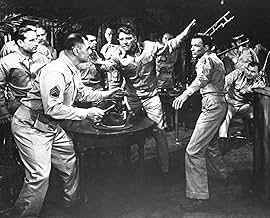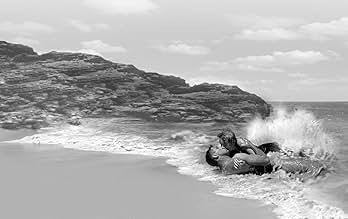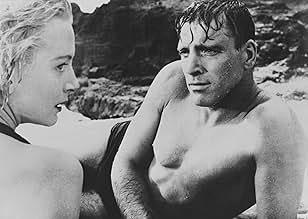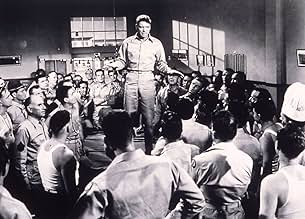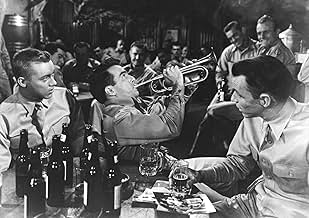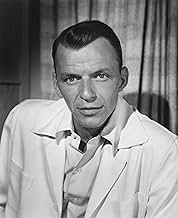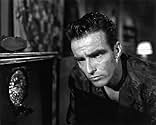IMDb RATING
7.6/10
53K
YOUR RATING
At a U.S. Army base in 1941 Hawaii, a pugilistic private is cruelly punished for refusing to join his unit's boxing team. Meanwhile, his commanding officer's wife and top NCO are indulging i... Read allAt a U.S. Army base in 1941 Hawaii, a pugilistic private is cruelly punished for refusing to join his unit's boxing team. Meanwhile, his commanding officer's wife and top NCO are indulging in a torrid love affair.At a U.S. Army base in 1941 Hawaii, a pugilistic private is cruelly punished for refusing to join his unit's boxing team. Meanwhile, his commanding officer's wife and top NCO are indulging in a torrid love affair.
- Director
- Writers
- Stars
- Won 8 Oscars
- 26 wins & 9 nominations total
Claude Akins
- Sgt. 'Baldy' Dhom
- (uncredited)
Vicki Bakken
- Suzanne
- (uncredited)
Margaret Barstow
- Roxanne
- (uncredited)
- Director
- Writers
- All cast & crew
- Production, box office & more at IMDbPro
Featured reviews
It's often said that the simplest stories are the best. This isn't true. The simple stories are easy to get right, but a complex ensemble piece with multiple protagonists and numerous subplots can be just as effective, although it's a lot harder to pull off successfully. From Here to Eternity stands in the tradition of The Best Years of Our Lives, Seven Samurai and The Godfather, of pictures with interwoven plots that have become classics thanks to strong screen writing, intelligent direction and powerful acting performances.
Part of the reason From Here to Eternity works is because it is very quick in establishing its characters and plot lines. It opens with a series of interlinking scenes, introducing us to Montgomery Clift, Frank Sinatra, Philip Ober, Burt Lancaster and Deborah Kerr, giving us clues about Clift's past and hinting at the future relationship between Lancaster and Kerr, all in the space of five minutes. Director Fred Zinnemann, with a confidence that is lacking in his earliest features, shoots these scenes with subtle technique to give them maximum storytelling effect. For example, he gives Clift's character a superb introduction, walking at a right angle to the marching column until he is brought right into close-up. Once the dialogue begins he uses sudden changes of angle to highlight certain lines, for example the close-up of Lancaster telling Kerr "I'd be happy to help", at which point the audience know exactly what is going to happen between those two characters. Donna Reed is of course introduced a little later, but to compensate she is given a very distinctive first shot, framed on her own immediately after some busy crowd shots.
But Zinnemann's direction isn't all pure functionalism. He makes sparing use of attention-grabbing stylisation when the moment demands it, such as the dolly-out through the rain-soaked window during Lancaster and Kerr's first kiss. And this stylisation even helps keep the narrative together, for example cutting from the roaring sea at the end of the famous beach scene to the smoke rising from Clift's cigarette. Throughout the various parallel plots there is a tone of melancholy and regret, and Zinnemann keeps this commonality with his consistency of style.
Of course, you get the same problem or at least the same feature in From Here to Eternity as you do in They Died with Their Boots on or Titanic, in that the audience, knowing their history, know what is going to happen at the end. The strength of the non-combat story lines is such that we forget when and where we are, and as such it is important that we are eased into the finale of the Pearl Harbour attack so it does not seem such a surreal break in tone. This is done with characteristic subtlety, with two objects placed noticeably yet not obtrusively into the frame to jog our memories. The first is a calendar showing December 6th on the wall beside Burt Lancaster, and the other a signpost reading "Pearl Harbour" after his final meeting with Kerr.
One of the biggest challenges for the makers of an ensemble piece is that you need a larger than normal pool of leading players, and yet you must ensure none of them will overshadow the others. This is another thing they got right in From Here to Eternity. Clift, Kerr and Lancaster are all competent performers without big egos, and they all give steady performances, even if they are far from career-bests. As to Sinatra, what's amazing is not the quality of his performance (it was always evident he could act) but that he was even allowed to play a dramatic, non-musical role. It just goes to show the increased flexibility of cinema in the 1950s, as well as the rising status of the musical genre. To give it some perspective, can you imagine Fred Astaire or Bing Crosby having done the same thing in the 30s? From Here to Eternity won 1953's Best Picture Oscar, and like all successful pictures was followed by a host of imitators. 1955's Battle Cry for example is another many-stranded story about soldiers at the start of World War Two, and even features a rather tepid knock-off of the famous beach scene. However, while Battle Cry has some nice moments, structurally it is an absolute mess, an example of how easy it is to do a botch job on a complex storyline. That's why From Here to Eternity is such a rarity, being an ensemble piece that really works.
Part of the reason From Here to Eternity works is because it is very quick in establishing its characters and plot lines. It opens with a series of interlinking scenes, introducing us to Montgomery Clift, Frank Sinatra, Philip Ober, Burt Lancaster and Deborah Kerr, giving us clues about Clift's past and hinting at the future relationship between Lancaster and Kerr, all in the space of five minutes. Director Fred Zinnemann, with a confidence that is lacking in his earliest features, shoots these scenes with subtle technique to give them maximum storytelling effect. For example, he gives Clift's character a superb introduction, walking at a right angle to the marching column until he is brought right into close-up. Once the dialogue begins he uses sudden changes of angle to highlight certain lines, for example the close-up of Lancaster telling Kerr "I'd be happy to help", at which point the audience know exactly what is going to happen between those two characters. Donna Reed is of course introduced a little later, but to compensate she is given a very distinctive first shot, framed on her own immediately after some busy crowd shots.
But Zinnemann's direction isn't all pure functionalism. He makes sparing use of attention-grabbing stylisation when the moment demands it, such as the dolly-out through the rain-soaked window during Lancaster and Kerr's first kiss. And this stylisation even helps keep the narrative together, for example cutting from the roaring sea at the end of the famous beach scene to the smoke rising from Clift's cigarette. Throughout the various parallel plots there is a tone of melancholy and regret, and Zinnemann keeps this commonality with his consistency of style.
Of course, you get the same problem or at least the same feature in From Here to Eternity as you do in They Died with Their Boots on or Titanic, in that the audience, knowing their history, know what is going to happen at the end. The strength of the non-combat story lines is such that we forget when and where we are, and as such it is important that we are eased into the finale of the Pearl Harbour attack so it does not seem such a surreal break in tone. This is done with characteristic subtlety, with two objects placed noticeably yet not obtrusively into the frame to jog our memories. The first is a calendar showing December 6th on the wall beside Burt Lancaster, and the other a signpost reading "Pearl Harbour" after his final meeting with Kerr.
One of the biggest challenges for the makers of an ensemble piece is that you need a larger than normal pool of leading players, and yet you must ensure none of them will overshadow the others. This is another thing they got right in From Here to Eternity. Clift, Kerr and Lancaster are all competent performers without big egos, and they all give steady performances, even if they are far from career-bests. As to Sinatra, what's amazing is not the quality of his performance (it was always evident he could act) but that he was even allowed to play a dramatic, non-musical role. It just goes to show the increased flexibility of cinema in the 1950s, as well as the rising status of the musical genre. To give it some perspective, can you imagine Fred Astaire or Bing Crosby having done the same thing in the 30s? From Here to Eternity won 1953's Best Picture Oscar, and like all successful pictures was followed by a host of imitators. 1955's Battle Cry for example is another many-stranded story about soldiers at the start of World War Two, and even features a rather tepid knock-off of the famous beach scene. However, while Battle Cry has some nice moments, structurally it is an absolute mess, an example of how easy it is to do a botch job on a complex storyline. That's why From Here to Eternity is such a rarity, being an ensemble piece that really works.
I really enjoyed this film. Frank Sinatra walked away with the Oscar, but I thought Montgomery Clift's performance was the standout. I know they weren't competing against one another, but if any actor were to win an Oscar I would have preferred Clift. Lancaster and Kerr gave the other great performances. I liked the interaction between Clift's and Lancaster's characters, particularly in the scene when Lancaster is telling Clift he could avoid fatigue duties 'if he were smart'. Clift replies 'Yeah, but I ain't smart', and Lancaster says 'I know, I know but if you were...'
I thought the best parts of this film came from the great acting of Kerr, Lancaster and Clift. It may suffer from being called a classic, making people's expectations high, but I thought it was very enjoyable.
I thought the best parts of this film came from the great acting of Kerr, Lancaster and Clift. It may suffer from being called a classic, making people's expectations high, but I thought it was very enjoyable.
1941. Private `Prew' Prewitt has been transferred to Hawaii. His new captain is keen to get promoted and sees Prew's former boxing prowess as his way to get noticed. However Prew has given up boxing and refuses to join the team leading the Captain to punish him in many different ways. Meanwhile Sergeant Warden is beginning an affair with the Captains maltreated wife. Prew himself finds a girl but his friend Maggio has conflict with Sergeant Judson. Meanwhile the threat of attack looms.
This is most famous for Warden and Holmes' adulterous passion as the waves lash over them. Probably people who haven't seen the film will still know that scene. However this film is much more than that. The plot has several main strands mostly involving romance running through it. It works well but it is really a soapy melodrama at the end of it all. This doesn't mean it's not enjoyable and intense but it is really that basic. The Pearl Harbour attack is tacked onto the end and didn't really grab me.
The central relationships are OK but the film is strongest in some very good male performances. Clift is great as the put upon private, while Lancaster deserves recognition for more than just snogging Kerr on a beach. Kerr and Reed are OK Kerr is better but none of the female roles are as good as the male leads. Warden, Sinatra and Borgnine are all great support and steal the show when they are on screen (Sinatra especially).
Overall I was surprised to see this film being hailed so high in many polls. I found it to be involving, interesting and well acted but at it's core it is a melodrama that has a few bangs at the end. Worth a watch.
This is most famous for Warden and Holmes' adulterous passion as the waves lash over them. Probably people who haven't seen the film will still know that scene. However this film is much more than that. The plot has several main strands mostly involving romance running through it. It works well but it is really a soapy melodrama at the end of it all. This doesn't mean it's not enjoyable and intense but it is really that basic. The Pearl Harbour attack is tacked onto the end and didn't really grab me.
The central relationships are OK but the film is strongest in some very good male performances. Clift is great as the put upon private, while Lancaster deserves recognition for more than just snogging Kerr on a beach. Kerr and Reed are OK Kerr is better but none of the female roles are as good as the male leads. Warden, Sinatra and Borgnine are all great support and steal the show when they are on screen (Sinatra especially).
Overall I was surprised to see this film being hailed so high in many polls. I found it to be involving, interesting and well acted but at it's core it is a melodrama that has a few bangs at the end. Worth a watch.
Classic 50's Hollywood feature documenting the lives and times of the US Army personnel in Hawaii leading up to the Japanese air attack on the Pearl Harbour naval base which precipitated the US entry into the second world war. Shot in black and white by Fred Zinnemann to emphasise the war-time setting, the drama is peopled with convincingly realistic characters with a credible, episodic narrative edging ever closer to the pivotal date of December 7th.
Multiple plot lines are skilfully interwoven until their climactic convergence at the end aided by top acting from a superb cast. The dramatic thread to the film is Montgomery Clift's Prewett character and his relationships with the characters played by Burt Lancaster, the firm but fair sergeant himself drawn into a sexually charged relationship with his superior officer captain's disaffected wife, played against type by Deborah Kerr, Donna Reed as the "hostess" he falls in love with and especially Frank Sinatra's rascally but likeable and always supportive Maggio.
Sinatra famously begged for the chance to show his acting skill in a straight role to reignite his career and duly given the chance, he grabs it with both hands. Lancaster and Kerr fire up the screen in their doomed relationship, especially in the famous scene by the crashing waves, Reed plays her part with admirable restraint but Clift's acting exceeds them all, whether in his reluctant fight scenes, blowing a bugle like Satchmo or playing a drunk after he's exacted revenge on Maggio's tormentor, played memorably by the recently deceased Ernst Borgnine.
The action climax as the Japanese attack is thrillingly portrayed especially the high camera shots, although I would question the too obvious and thus jarring insertion of real footage of the actual attack.
Controversial in its day for its unblinkingly honest depiction of the US army, it can be seen now as one of the best films of the 50's, a master class in dramatic narrative and character acting.
Multiple plot lines are skilfully interwoven until their climactic convergence at the end aided by top acting from a superb cast. The dramatic thread to the film is Montgomery Clift's Prewett character and his relationships with the characters played by Burt Lancaster, the firm but fair sergeant himself drawn into a sexually charged relationship with his superior officer captain's disaffected wife, played against type by Deborah Kerr, Donna Reed as the "hostess" he falls in love with and especially Frank Sinatra's rascally but likeable and always supportive Maggio.
Sinatra famously begged for the chance to show his acting skill in a straight role to reignite his career and duly given the chance, he grabs it with both hands. Lancaster and Kerr fire up the screen in their doomed relationship, especially in the famous scene by the crashing waves, Reed plays her part with admirable restraint but Clift's acting exceeds them all, whether in his reluctant fight scenes, blowing a bugle like Satchmo or playing a drunk after he's exacted revenge on Maggio's tormentor, played memorably by the recently deceased Ernst Borgnine.
The action climax as the Japanese attack is thrillingly portrayed especially the high camera shots, although I would question the too obvious and thus jarring insertion of real footage of the actual attack.
Controversial in its day for its unblinkingly honest depiction of the US army, it can be seen now as one of the best films of the 50's, a master class in dramatic narrative and character acting.
... from what we feed on these days and perhaps only of relevance as an artefact of the time it was released and the period it reflects, the way we behave and interact in the real world has changed unrecognisably since. It does, however, deliver us some top drawer performances from some genuinely talented performers, most of them to go on to much bigger and better things. All in all, a solid 1950s era film set in the prior decade before the outbreak of war, it uses multiple and interlinked sub plots to show us the sorrow and sadness experienced by numerous characters as a result of the choices they've made, the people they met and how they interacted.
Oscars Best Picture Winners, Ranked
Oscars Best Picture Winners, Ranked
See the complete list of Oscars Best Picture winners, ranked by IMDb ratings.
Did you know
- TriviaMontgomery Clift threw himself into the character of Prewitt, learning to play the bugle (even though he knew he'd be dubbed) and taking boxing lessons. Fred Zinnemann said, "Clift forced the other actors to be much better than they really were. That's the only way I can put it. He got performances from the other actors, he got reactions from the other actors that were totally genuine."
- GoofsThe impromptu bugle solo in the club includes notes that only a trumpet could hit.
- Quotes
Robert E. Lee "Prew' Prewitt: Nobody ever lies about being lonely.
- Crazy creditsOpening credits prologue: SCHOFIELD BARRACKS HAWAII 1941
- ConnectionsEdited from Pearl Harbour (1943)
- SoundtracksRe-enlistment Blues
(1953)
by James Jones, Fred Karger, Robert Wells
Sung by men in the barracks twice
Played often in the score
Details
- Release date
- Country of origin
- Language
- Also known as
- De aquí a la eternidad
- Filming locations
- Halona Beach Cove, O'ahu, Hawaii, USA(Warden and Karen's kissing in the surf scene)
- Production company
- See more company credits at IMDbPro
Box office
- Budget
- $1,650,000 (estimated)
- Gross US & Canada
- $36,416
- Opening weekend US & Canada
- $18,176
- Dec 7, 2003
- Gross worldwide
- $36,416
- Runtime
- 1h 58m(118 min)
- Color
- Sound mix
- Aspect ratio
- 1.37 : 1
Contribute to this page
Suggest an edit or add missing content



